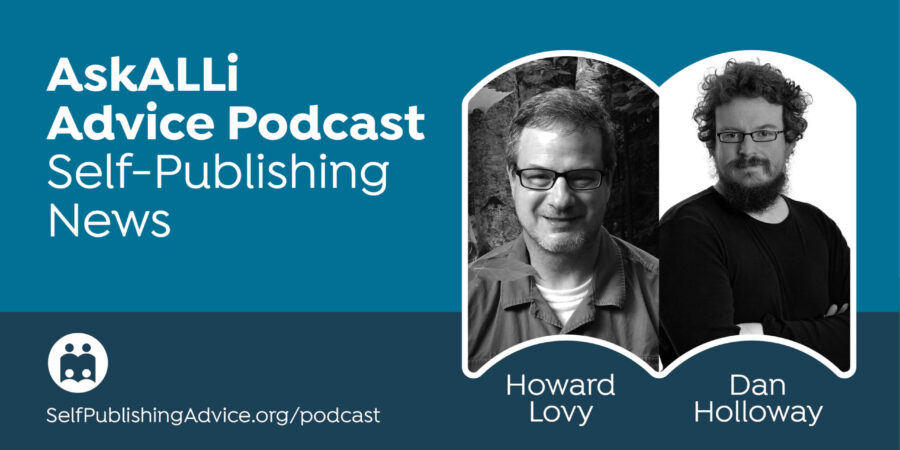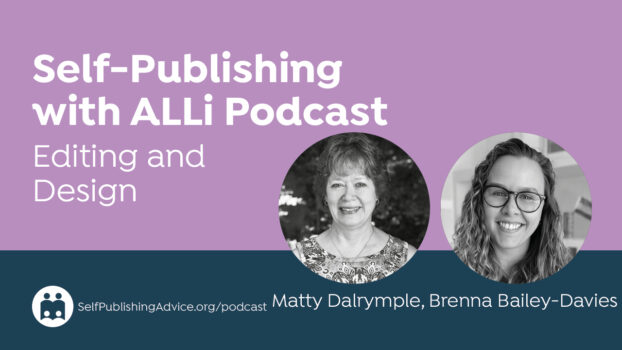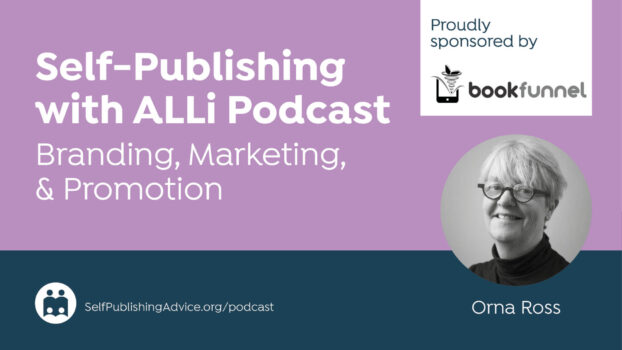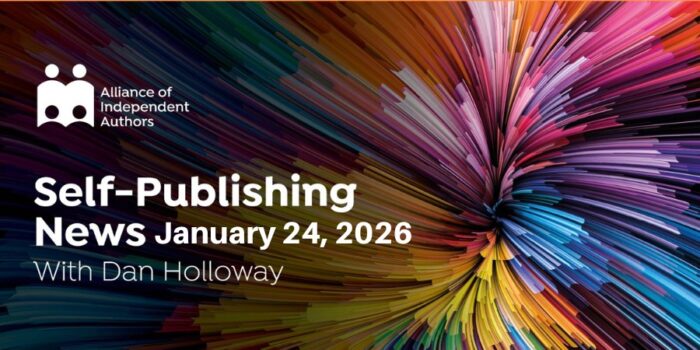Today on Self-Publishing News: Indie publishing is a great news story! I've given ALLi News Editor Dan Holloway the month off while I focus on the 10th anniversary of the Alliance of Independent Authors. I recently flew from my hometown of Traverse City, Michigan, to London to attend the London Book Fair, where my colleagues at ALLi were celebrating a decade since our founder, Orna Ross, launched the self-publishing group at 2012's book fair. I come from a journalism background, so I did what I enjoy doing at events like this. I interviewed people. And, today, I'll feature many of their voices about where indie publishing has been, where it is today, and where it's going.

Howard Lovy at London Book Fair.
Above all, I think of indie publishing as a great news story, and one that I'm happy to be covering both as a member of ALLi and as a journalist. For me, the rise of indie publishing suits my personality. In my days as a business and technology reporter, if the rest of the media pack were headed one way, I’d head the opposite. That’s where the interesting stories were. Who is going against the grain? Who is innovating?
The old system of publishing is based on outdated technology and assumptions. But technology has progressed to the point where authors need not play by established rules. Independent-minded authors, or those who wish to retain control over their own work and ability to earn from it, can choose not to play the old game.
And that's where we'll begin, with ALLi cofounder and director Orna Ross, who talked about this shift in author attitudes that she's witnessed over the past decade.
Find more author advice, tips and tools at our Self-publishing Author Advice Center: https://selfpublishingadvice.org, with a huge archive of nearly 2,000 blog posts, and a handy search box to find key info on the topic you need.
And, if you haven’t already, we invite you to join our organization and become a self-publishing ally. You can do that at http://allianceindependentauthors.org.
Listen to Self-Publishing News: Indie Publishing News Story
On the Self-Publishing News #Podcast, @howard_lovy interviews indie authors at the London Book Fair on where self-publishing has been and where it's going. Share on XSubscribe to our Ask ALLi podcast on iTunes, Stitcher, Player.FM, Overcast, Pocket Casts, or Spotify.
About the Hosts
Dan Holloway is a novelist, poet and spoken word artist. He is the MC of the performance arts show The New Libertines Earlier this year he competed at the National Poetry Slam final at the Royal Albert Hall. His latest collection, The Transparency of Sutures, is available on Kindle.
Howard Lovy has been a journalist for more than 30 years, and has spent the last eight years amplifying the voices of independent publishers and authors. He works with authors as a book editor to prepare their work to be published. Howard is also a freelance writer specializing in Jewish issues whose work appears regularly in Publishers Weekly, the Jewish Daily Forward, and Longreads. Find Howard at howardlovy.com, LinkedIn and Twitter.
Read the Transcript: Indie Publishing News Story
Howard Lovy: I am Howard Lovy and you're listening to a special edition of Self-Publishing News from the Alliance of Independent Authors. I've given ALLi news editor Dan Holloway, the month off while I focus on ALLi's 10th anniversary.
I recently flew from my hometown of Traverse City, Michigan to London to attend the London Book Fair, where my colleagues at ALLi were celebrating a decade since our founder, Orna Ross, launched the self-publishing group at 2012's book fair.
I come from a journalism background, so I did what I enjoy doing at events like this, I interviewed people, and today I'll feature many of their voices about where indie publishing has been, where it is today, and where it's going.
Above all, I think of indie publishing as a good news story, and one that I'm happy to be covering, both as a member of ALLi and as a journalist. For me, the rise of indie publishing suits my personality. In my days as a business and technology reporter, if the rest of the media pack were headed one way, I'd head the opposite. That's where the interesting stories were. Who is going against the grain? Who is innovating? The old system of publishing is based on outdated technology and assumptions, but technology has progressed to the point where authors need not play by established rules. Independent minded authors, or those who wish to retain control over their own work and ability to earn from it, can choose not to play the old game. And that's where we'll begin, with ALLi co-founder and director Orna Ross, who talked about the shift in author attitudes that she's witnessed over the past decade.
Orna Ross
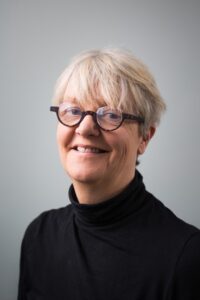
Orna Ross, Director of ALLi
Orna Ross: When an author is rejected by this system, and the system is very much built around certain parameters, authors can take it far too personally.
And similarly, when they get an offer from this system, they can also take it too personally. So, they think, as I said, that they've got a friend, they think they've got, you know, my publisher and my agent. In actual fact, they are businesses, and now what we're seeing is that authors are creating their own businesses, and they're becoming more mature in their understanding of these things.
So, the agreements that we sign as independent authors are really important, and while the trade publishing world will reject you until it accepts you, and that can feel like a validation of all that hard work, I know that's certainly how I experienced it, readers are now the judges. Readers are now the people who give you that validation, and readers will give you a hard time too, I can tell you. Yes, certainly you've got a positive connection, but you'll also get the negative reviews, and you're also get readers who write to you with opinions, and so on.
So, as authors we need to grow, we need to grow and develop, and I think that's why we choose to write, because we need to grow. And nothing will grow you like writing a book, finishing a book, publishing a book. It's a huge, expansive creative experience, you are not the same person once you've done that.
And publishing is the same. That is true, and just writing and finishing a book will do that for you, then publishing brings in a whole other dimension of growth.
And business then, when you start to want to make a profit, and you want to earn a living as a writer, there's a lot of expansive and creative growth in that as well.
So, when you bring those three together, you've got to be quite a person to pull off all of those things, and you also need quite a bit of time. It's not something you can do overnight, but when you do bring all of those together, what you gain is enormous. You gain a sense of empowerment and of confidence that our community traditionally has not had.
Howard Lovy: And over the last 10 years, Orna said, that sense of empowerment has been noticed in traditional publishing spaces. Not by everybody, but some.
Orna Ross: 10 years ago, we launched here, in 2012, it's our 10th anniversary. At that time, people used to talk about the stigma of self-publishing, and now I see the pride in self-publishing. Not everybody, you know, there's still a whole tranche of trade publishing that doesn't understand what's going on in the indie space, doesn't understand about the creator economy, doesn't understand how authors are selling direct to their readers themselves. It thinks of publishing as Amazon KDP, it doesn't even understand that self-publishing is so much more than that, but indie authors are beginning to know. Now, you see people being really proud of what they have achieved, and I don't hear anybody talking about stigma anymore.
Howard Lovy: Without the stigma attached to self-publishing, authors can focus on what's important, like writing and selling their books, and through ALLi, sharing information on how to do it.
Orna Ross: I think the great thing about author-publishing is we're all the same, we all start in the same place. We start with that blank page; we've got to do the writing and got to finish the first draft. We've got to finish the final draft. We've got to get it together and got to produce it. We've got to get it edited, get our designer, get it distributed, and then we have to market and promote it, and we're all in the same situation.
We'll all take very different journeys, and we'll all do those things in very different ways, no two books will look the same, feel the same, read the same, but we know what it's like to be there. So, there is no hierarchy, that's one of my favourite things about our organization is there's absolutely no hierarchy. And I face the blank page tomorrow, same as you, and same as everyone who's listening.
And it's a really flat organization, from that point of view, everybody talks to everybody, everybody's on the forum, everybody's bringing information, and I learn every single day, things that I don't know, from our members. So, it's really, really inclusive, and it's great from that point of view.
Philip Lynch

Philip Lynch
Howard Lovy: ALLi's co-founder is Orna Ross's husband, Philip Lynch. Phillip was a supply chain specialist in the paper industry and had just gone back to college to do post-graduate work in dispute and conflict resolution when Orna came up with this idea to launch ALLi.
It captured his attention, because he knew the technology and the market were combining to create an opportunity for authors.
Philip Lynch: We're still at the very early stages of the empowerment of authors to publish their own books. So, I think the most interesting thing is, I think there's going to be a huge growth in author-publishing.
I think there'll be a situation very soon where every single author would consider whether they should self-publish or use the traditional publishing route. And I think in the future, a lot more will vote for self-publishing because of the important subject of holding onto your rights.
The technology has been changing, and it will continue to change and continue to support authors in the journey, but ultimately, they will remain a support to the creative process of creating your own book.
Howard Lovy: Now, Phillip is usually a behind the scenes person, happy to let Orna be the public face and voice of ALLi. Still, I convinced him to talk a little bit about what drives Orna Ross.
Philip Lynch: Well, I don't know what people know about Orna, but she has an absolute in-depth love for writing, always has. She reads extensively, she's a speed reader, which probably people don't know. Also, she has a deep interest in creating independence for other authors, because of her own journey. She had a journey where she was traditionally published, where she had people decide what they wanted to do with her book, and she had little or no input into it, and she saw that as a loss of power.
And then she saw traditional publishing not using that commodity and promoting it, and as a result of that, she saw that, if you could do that for yourself, how much more value you could add if you were dedicated to doing it.
It's not everybody's path, some people do not and won't be self-publishers, but if you do it, there's a lot of rewards there.
Hard work. Orna is an extremely hard-working person, dedicated, loves the craft of writing, and loves self-publishing. I don't think I have anything to tell you about Orna that nobody else knows about.
Debbie Young
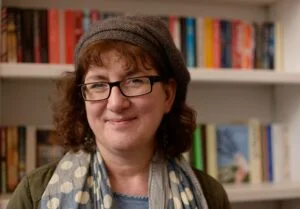
Debbie Young
Howard Lovy: Orna and Phillip are family, obviously, but what they created 10 years ago, and continue to grow today, is an extended family of indie authors, that's the way Debbie Young sees it.
She should know, she's in charge of the Facebook forum for ALLi members, where indie authors support one another.
Debbie Young: It's a source of great camaraderie and moral support as well, and because it's well-managed, it's not at all a self-promotional forum. People are there to help each other, to ask questions, find answers, share answers, and it's been really gratifying over the years to see the development as people have come on from, sort of nervously entering the forum early on in their self-publishing career, to publishing more and more books and ending up as one of the people who's always there giving answers rather than asking questions. So, that's one of the really gratifying things about being a part of ALLi, is seeing how much everybody has grown, and will continue to grow.
Howard Lovy: Debbie Young is also a successful, cozy mystery author who credits ALLi for helping her launch her indie publishing career and for sustaining it.
Debbie Young: I'm still loving it, and I'm just incredibly grateful that I discovered self-publishing when I did, and that I joined ALLi, because without ALLi, I would not be as successful as I am today. I would not be as contented. I would not be as knowledgeable. I would not have hooked up with so many authors all over the world. Although we're in London here, ALLi has been wonderful at bringing me new author friends all over the world, all points of the compass, all parts of the globe. That's another great joy about it.
Kate Woodard

Kate Woodard
Howard Lovy: Being an author can feel very isolating, especially if you live in far-flung areas around the world. That's how children's author, Kate Woodard felt when she lived in a remote area of Brazil. It wasn't until she found ALLi that she really felt part of an author community.
Kate Woodard: I started listening to them when I was living in Brazil, because there's not really a community there of independent authors. So, I was looking around the internet and came across ALLi, and started listening to their podcasts and reading what they had to offer, and I felt like I had found my community online, at least, so I had some kind of support.
Margaret Skea
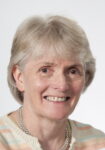
Margaret Skea
Howard Lovy: To Margaret Skea, the story of indie publishing needs to merge with a story of publishing itself. That's why she's also on the management committee for the Society of Authors, where she's trying to change attitudes towards indie publishing.
Margaret Skea: I'm on the management committee of the Society of Authors, and my, sort of, raison d'etre for being there is to try and get rid of any kind of distinction between traditionally published and independently published authors, because as far as I'm concerned, a good book is a good book, and it shouldn't matter how it actually gets to market. It should be judged on its own merit and an author should be judged on their own merit.
So, I'm trying to cross that divide, and bring people together, and get wider recognition of every form of publishing, however it works.
Sacha Black

Sacha Black
Howard Lovy: When ALLi was founded 10 years ago, indie publishing was barely even an afterthought at events like the London Book Fair, but over time, indie authors have created a kind of fair within a fair, taking the opportunity to network with one another. That's what author and ALLi blog editor, Sacha Black, gets out of an event like this one.
Sacha Black: I think it is vital, because even if you think that saying hello, exchanging email addresses or names, doesn't seem like a big deal, when you later run into a problem or an issue, or you want to get into a beta program, for example, they'll recognize your name and they'll be happier, well not happier, because obviously they want to provide excellent services, but you usually find that you get responses quicker.
Or you you've built that network and you have a friendship, and then your colleagues expand and yeah, I don't know, I have found the networking to be absolutely essential. You open doors for yourself, you build relationships, you make collaborations easier. It's easier to get people on my podcast, for example. So, I think it's really important.
Rohan Quine

Rohan Quine
Howard Lovy: Speculative fiction author, Rohan Quine's work is very unique with genre-bending fiction and books on video. His work is something that traditional publishers may not touch, but there's a place for him in ALLi.
Rohan Quine: One of the things I like, in particular, about it is that it's a broad church, in the sense that it doesn't, as I half-feared that session organization might ahead of time, it does not say, this is how you must do things. It does not, for example, respect only authorpreneurial characters. We all have general respect for entrepreneurial characters, of course, that is an absolutely legitimate way of doing things. But as we know, it is not the only way of doing things. Some of us are barmy enough to write very strange, artistic, literary, genre-blending, and genre-bending things, and that's our vision and it's an absolute blast to put that stuff out there. And it is by nature, as would be the case for trad pub as well, that material is not cut out to be the kind of material that entrepreneurial authors will be able to put out in an authorpreneurial way, in particular around the world. It's designed to find a smaller niche and ALLi is absolutely on board for that, and for many other kinds of shadings in between those two extremes.
Howard Lovy: Rohan is experimenting with eBooks that also link to video content, because he's convinced that the future of books will also contain an interactive element. So, he's laying the groundwork for the future.
Joanna Penn

Joanna Penn chairing a talk at London Book Fair
And that brings us to my interview with Joanna Penn. I saved her for last because, while she was an early adopter of indie publishing, she also has one foot firmly in the future. Joanna has been self-publishing since 2007. She says that 2012, the year that ALLi was founded, was when it started to go mainstream.
Now in 2022, we're at the beginning of the next phase, another reinvention of the self-publishing model. I asked her how she determines what new technology has a future and what is a distraction.
Joanna Penn: It's never a distraction, it's an investigation, and I think you can only really be successful as an independent creator, if you try things. And I started trying things in 2007, and I'm still trying things. And so, I tried podcasting in 2009, and podcasting didn't really go mainstream till 2014. So, I always feel like I'm about five years too early.
So, I did self-publishing in translation way too early, but now that's a big thing for indies. So, I don't feel like anything I'm doing is a distraction, I feel like I'm building for the next 15 years. Jeff Bezos himself, said business models last 15 years, and there's a reason he left Amazon.
So, I feel like I'm building for the next 15 years, between now and like 2035-2037, what is my business going to look like between now and then when I'm late fifties, I guess. I want to be doing this for the rest of my life, so for me, it's very clear that there are signals in the world that show us that many of these technologies will become mainstream.
Howard Lovy: Joanna feels the same way working with AI tools now. She feels like it's 2007 all over again, and we're about to enter the next phase.
Joanna Penn: I still remember how I felt when I saw my book on an iPhone. The iPhone only launched in 2007, and the Kindle as well, I remember looking at my book on those devices and going, this is the future, this is the future.
And I feel the same way right now about working with AI tools. AI tools are going, well, they are already, many of us use Pro Writing Aid, for example, and Grammarly, for working, not to replace editors, but with our editing process.
Obviously, many people use Amazon advertising, which is based on AI.
Everyone's already using AI in their businesses, it's just the creation tools are starting to emerge. Web3, NFTs, blockchain, this is all new business models. In the same way that, for example, Orna and ALLi have been talking about selling direct, I've been doing that since 2008 and now it's going mainstream, and Web3 is just another iteration of selling direct, it's going to add to our business models.
So, while obviously you'll still do print, you'll still do Amazon, you'll still do Kobo, and Apple, and all that stuff, you'll also do other things that will offer higher-price digital, special-edition digital, and we've never had that before. We've never had special-edition digital with resale percentages going back to the creator, smart contracts that will enable collaboration.
There's so much positive change coming that I just want to help authors realize what could be coming, and you don't have to do anything now, but in the next five years, you will have to decide what you want to embrace in order to keep making money with this business.
Howard Lovy: From Orna's vision 10 years ago, to Joanna's vision for the next decade, I'm excited about how self-publishing is changing the way the world reads and writes. It's a story that I'll continue to follow. And Joanna Penn says, it's still the story itself that's king. All this new technology will ultimately free indie writers to focus on what's important, their own creativity.
Joanna Penn: Things have changed so much since 2007, and I can't see that it won't be the same again. Humans have a tendency to think that it'll just stay this way, but if you take that bigger view and you zoom out a bit, and I know Zoom itself, there's a word, but if you consider what has changed since 2007, and in The Indie Author Magazine, the ALLi magazine, it's documented the last 10 years, but as I said, it's been 15 since I started and it is dramatically different. I mean, even now I just picked up a direct sale of drop-shipping print books, which fills another hole in my direct sales model that I haven't been able to fix. And so, I'm like, wow, that's brilliant, I just found a new tool.
So yeah, I think we just have to keep that desire to learn, to find new things, to expand our capabilities and keep creating.

